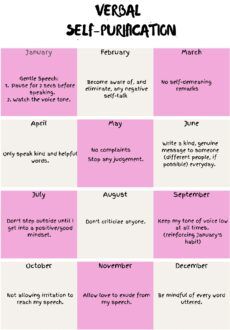Have you noticed how most of the mess in our lives arise due to words we utter or our physical actions? As long as statements, opinions or feelings remain within, our life seems to be mostly under control, but unfortunately as soon as we choose to grace the world with our opinions, all hell can break loose. You may recall that in one of His Zoom discourses back in 2021, Swami encouraged us to practice mindful speech for a month. To be honest, I did quite well for a month, then it all went down the drain. Don’t tell me that you’re still being mindful of every word you speak?! Are you? Oh, Go away please! If you’re a normal human, and like me, you also struggle to be mindful every so often, then you might agree that this spiritual ‘path’ isn’t exactly a piece of cake. At most you can eat eggless cake along the way, but that’s about it.
There’s hope, though! Thanks to Nikunj’s amazing idea, I decided to take the big jump and share my vision board. I made a list of habits which I intend to take up this year, but this is only part of it. I’ll be back with one more vision board for mental purification.
When I read the comments on Swami’s latest post, I admit that it was painful to see how much hurt we all carry within. Through a simple practice of mindful speech, we could easily avoid a lot of regret. Over the past few months, I have said a lot of things which I regret, and I can confidently conclude that the act of talking is a very impulsive act. And it’s especially ‘dangerous’ when we are interacting with our inner circle. In fact, because those who are closest to us are so accepting and forgiving, we allow ourselves to utter hurtful words in harsh tones. On the other hand, we are on our best behaviour in the presence of a grumpy boss. Hence, in my #bebetterwithosme, the first habit on my vision board is that of mindful speech.

January, September, October & December
I’ll try to pause for 2 seconds before speaking. Additionally, if I find myself speaking loudly, I shall tone it down. My voice, not abs. Maybe I’ll have a board for the abs too, later, let’s see. Jokes aside, the idea is to minimize regrets which follow the use of hurtful words. If you have already mastered mindful speech, then I think you’re safe to skip this post, but if you wish to join me on this ride, come, let’s all squeeze into this vehicle of Divine grace and get going. Because it is the hardest habit to implement, I have ensured that it is repeated enough times, covering various aspects across the entire year.
February & March
I realised that comfort is the enemy of progress. Have you noticed how we freely demean ourselves and comfortably indulge in negative self-talks, if someone is happy to listen to us? A single negative remark about ourselves can lead to an avalanche of negativity, whereby our little brain becomes no less than a broken tape stuck on repetitive negative self-talk. “You are no good” “You deserve to be sad. Do you remember how you hurt that friend 4.5 years ago on 22nd August at 5.30pm?” And on and on. As part of the purification of speech, I thought that it would be wise to include some self-compassion in the form of silencing that negative voice which brings down our self-esteem. Charity starts at home after all.
April, May, August & November
You may remember that in one of His discourses, here, Swami mentioned that the way to spend spiritual wealth is through anger, gossip, hurting others, criticism etc., and that’s absolutely correct. This year over the coming months, may Swami help me, I hope to be so mindful of my speech that only useful, kind and non-judgemental words come out of my mouth, and in a gentle way. Have you ever taken a moment to observe someone who’s speaking in an angry and unpleasant manner? I did. A few times. Just the other day, for a brief moment, I witnessed a driver speaking on the phone and through his body language, I could tell how angry and upset he was. I got a little scared too. Thankfully I was quite far away, so I didn’t have to worry about being run over by his car, but the good thing was that it increased my eagerness to take up this challenge of speech purification.
June
The easiest route to happiness is kindness. I was watching “How one act of kindness a day can change your life” by Mark Kelly the other day, whereby he mentioned that an act of kindness is the most selfish thing one can do. It’s true, because kindness nourishes the soul; not the recipient’s soul, but ours. Although I have included a RAK as my habit for the month of June, I’ll surely keep at it throughout the year. It is the best recipe for better mental health and self-love too.
July
To tell you the truth, I read some of Swami Vivekananda’s works a few years ago, perhaps in 2016 or so. And one thing stayed with me. “Don’t leave your house if you cannot put a smile on your face first!” Honestly, I have not applied this in my life so far but we’d all agree that grumpy faces should stay away from us, right? So, as July will be a summer month, I’ll try to implement this piece of wisdom. I may give it a go from now on, but then I had to spread out the habits over 12 months. Let’s see how this goes.
So, does anyone want to join me on this speech purification journey? If you have OCD you may chase me down for explaining my vision board in such a messy way, but that’s just to test and increase your patience. Yup! Okay, okay, that’s enough mischief for the day.
My overall mission with this plan is to to become a better and more gentle person. But that’s not all. While thinking about this vision board, I remembered Swami’s post, Covid-19 and a beautiful life , whereby he quoted a beautiful passage. I am sharing this small excerpt from Swami’s post, as I feel it is very relevant to mindful speech:
We need peace, harmony and camaraderie more than ever before; compassion and empathy for our fellow beings and for mother nature. Ultimately, being kind will be worth it, for such is the basic nature of goodness. In the end, it’s always worth it. For no apparent reason that I can understand, I was just reminded of this TED talk by Benjamin Zander I heard a few years ago. In his wonderful talk, he cites the story of a woman he met, an Auschwitz survivor. I quote:
I learned this from a woman who survived Auschwitz, one of the rare survivors. She went to Auschwitz when she was 15 years old. And her brother was eight, and the parents were lost. And she told me this, she said, “We were in the train going to Auschwitz, and I looked down and saw my brother’s shoes were missing.
I said, ‘Why are you so stupid, can’t you keep your things together for goodness’ sake?’” The way an elder sister might speak to a younger brother. Unfortunately, it was the last thing she ever said to him, because she never saw him again. He did not survive.
And so, when she came out of Auschwitz, she made a vow. She told me this. She said, “I walked out of Auschwitz into life and I made a vow. And the vow was, “I will never say anything that couldn’t stand as the last thing I ever say.” Now, can we do that? No. And we’ll make ourselves wrong and others wrong. But it is a possibility to live into. Thank you. Shining eyes. Shining eyes.
I remember feeling teary-eyed listening to this story. It was so powerful that it almost erased what I’d heard in Benjamin’s talk before this narration. Only this story remained etched in my mind.
I can say with conviction that I don’t want the last words that I utter to anyone to be harsh or hurtful. I don’t want to leave behind a legacy of unkind words nor do I want to have regrets related to said or unsaid words, hence my determination to master mindful speech. In fact, this is the first time that I am publishing my plan before even getting started with it, but then I thought that 2023 should be the year that I do things differently. Thank you Nikunj and os.me. Let’s go, shall we?!









Comments & Discussion
11 COMMENTS
Please login to read members' comments and participate in the discussion.